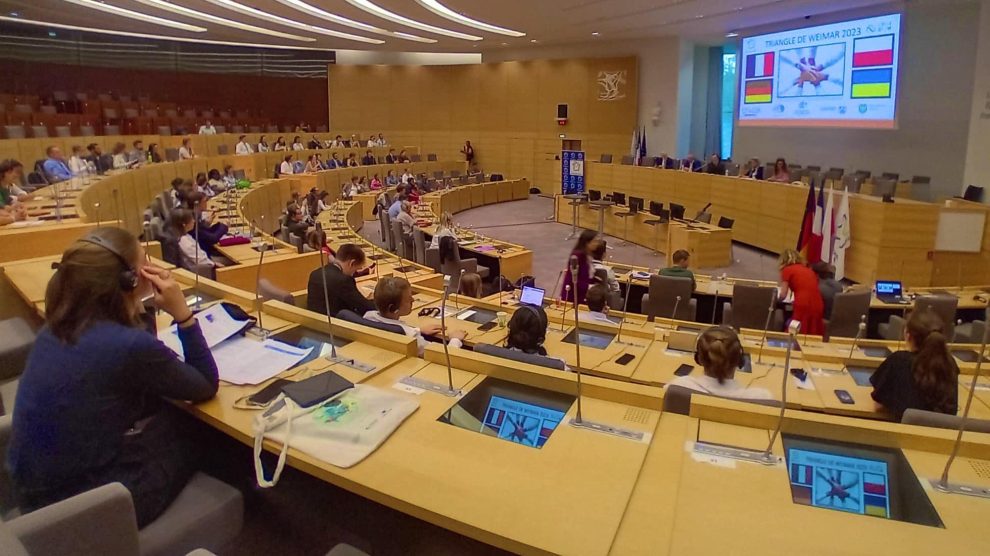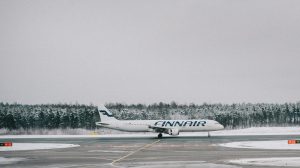Annual projects within the framework of the Regional Weimar Triangle merge events in the fields of culture, economy and cooperation of partner regions.
The Silesian Voivodeship is not only a region with huge economic potential attracting investors from all over the world, but also a partner in international cooperation at the cultural and economic level.
One example is the cooperation implemented in the formula of the Regional Weimar Triangle, which was created on the model of the Weimar Triangle, the Committee for the Promotion of French-German-Polish Cooperation. The Weimar Triangle was established on August 28-29, 1991 in Weimar, Germany, by the Ministers of Foreign Affairs of Poland, Germany and France: Krzysztof Skubiszewski, Hans-Dietrich Genscher and Roland Dumas.
Following the model of the Weimar Triangle, the Regional Weimar Triangle was established on August 22, 2001 as the initiative of the Silesian Voivodeship, North Rhine-Westphalia and Hauts-de-France (originally Nord-Pas de Calais). Based on the agreement, one of three projects is organised annually, alternately in each of the topics: Youth Summit, Kulturatrium project and Expert Meetings in the form of conferences. This year, the partner regions unanimously decided to include participants from Ukraine in each of these projects.
Youth summit
A key cooperation project of the Regional Weimar Triangle is the Youth Summit hosted this year by the Hauts-de-France region. The youth carried out the programme from July 23-29, 2023, ending with a debate with representatives of the authorities of the three regions. This project that has been running since 2001.
The participants are young representatives of the following regions: Silesian Voivodeship, Hauts-de-France and North Rhine-Westphalia (a group of 15 people from each region, this year expanded by several participants of Ukrainian origin).
This year’s edition was devoted to the theme: “The energy transformation, forced by the fight against global warming, must face an additional challenge of energy sovereignty. This transformation has accelerated rapidly. How can our industrial regions and their residents respond to this challenge between energy efficiency and sustainable use of energy?”
During the event, the young people participated in workshops, and were able—during discussions with the other participants, as well as experts from the three regions and during field visits—to discuss the most important issues related to the energy transformation, and above all the challenges it brings. During the debate, the young people presented the results of the week’s work and presented their recommendations to take action for the energy transformation as soon as possible.
Uncompromising ambassadors
The Silesian Voivodeship was represented by Krzysztof Klimosz – a Member of Silesian Voivodeship Board, who said: “I am very encouraged to see the involvement of Young People from our Regions in sensitising our generation to the challenges posed by climate change and the need to take effective action as soon as possible so that future generations can live in good conditions. This was a very valuable and important discussion for me. I am convinced that young uncompromising ambassadors of our planet will rise the climate challenges they face.”
The Kulturatrium project, which consists of an artists’ residency followed by the presentation of the results of their joint work in front of the audience, ended on June 13, 2023 in Bochum, Germany. There, in the historic building of the former central railway station, artists from the circle of hip-hop culture and urban arts from Poland, France, Germany and Ukraine, presented live performances in front of the audience.
The delegation from the Silesian Voivodeship was represented by Aleksandra Samira-Gajny – deputy Director of the Department of Economy and International Cooperation of the Marshal’s Office of the Silesian Voivodeship, who confirmed the continuing interest in further exchange of experience and contacts: “We are constantly rediscovering the potential of trilateral interregional relations, mainly because cooperation is primarily based on people and depends on them. They are its foundation and driving force. Contact with other people, the opportunity of being and creating together, as well as creating a network of professional and friendly connections are the added value of the projects. I am convinced that this will continue to be so.”
Silesia to host meeting of experts
The host of the meeting of experts this year, the third project implemented as part of the Regional Weimar Triangle, will be the Silesian Voivodeship. The topic of the meeting, planned for September 25-27, 2023 in Katowice and Tychy, will be the circular economy: processing of bio-waste and generating energy from biodegradable waste. This year, in addition to specialists from partner countries, it is planned to invite experts from Ukraine to participate in the discussion. In total, in the group there will be about 20 people.
The existing trilateral joint statement of cooperation expires next year. The works on a new document are being undertaken, and it is expected to be signed in 2024.
To sum up, the annual projects within the framework of the Regional Weimar Triangle merge events in the fields of culture, economy and cooperation of partner regions. They are an opportunity to exchange thoughts, ideas and insights of experts, politicians, artists and young people from Europe, who will shape the political, economic, environmental and cultural scene in the future.
Photo courtesy Hauts-de France.
This content has been produced in collaboration with a partner organisation through our Global Visibility Programme. Our programme helps companies boost their digital presence and strengthen the thought leadership of their experts. Find out more here.






Add Comment